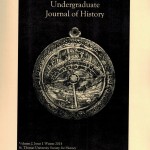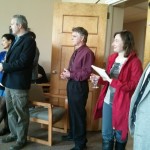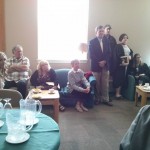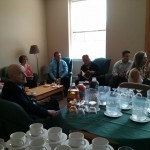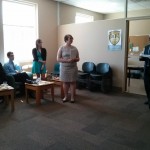Thursday, September 25, 2014

Eminent world and environmental historian John R. McNeill will deliver a lecture entitled “Writing Global-scale History: Professional and Personal Reflections.” McNeill will reflect on the attractions and perils of writing global-scale history, the strengths and weaknesses of unifying ideas that world historians use, and the compatibility of certain broad themes, such as environment, gender, class, and culture, with world-historical analysis.
Tuesday, September 23, 2014
We are excited to announce the public launch of the history department’s new Institute for World History. Please check out our website!

Thursday, September 18, 2014
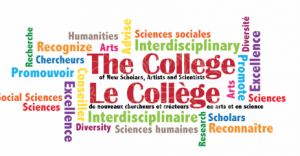 Kudos to Dr. Michael Dawson who was elected to the Royal Society of Canada’s College of New Scholars, Artists and Scientists.
Kudos to Dr. Michael Dawson who was elected to the Royal Society of Canada’s College of New Scholars, Artists and Scientists.
The college is Canada’s first national system of multidisciplinary recognition for the emerging generation of intellectual leadership.
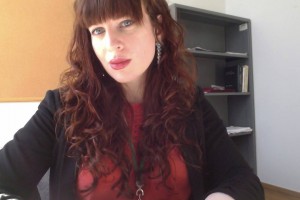 We are delighted to welcome Dr. AnnaLinden Weller, our new Visiting Assistant Professor, to St. Thomas. She offers courses in Byzantine, Islamic, Armenian, and medieval European comparative and world history. Her research focuses on pre-modern imperialism, border cultures and literatures, Byzantine-Armenian relations, and letter-writing. When she’s not teaching or researching, she writes science fiction (also about empires, but with some extra artificial intelligence and cybernetics in). She’s from New York City, though she’s lived in three countries in the last three years.
We are delighted to welcome Dr. AnnaLinden Weller, our new Visiting Assistant Professor, to St. Thomas. She offers courses in Byzantine, Islamic, Armenian, and medieval European comparative and world history. Her research focuses on pre-modern imperialism, border cultures and literatures, Byzantine-Armenian relations, and letter-writing. When she’s not teaching or researching, she writes science fiction (also about empires, but with some extra artificial intelligence and cybernetics in). She’s from New York City, though she’s lived in three countries in the last three years.
She will offer the following courses in the Fall semester:
HIST 1006: This section of World History will explore patterns of continuity and change in world civilizations using visual and written propaganda to think about state power and resistance to it, empires, and cosmopolitanism.
HIST 2553 — History of the Islamic World: In this course, we will discuss the first 800 years of Islam from a world-historical perspective. Islamic culture ranges from Arabia to China, Africa, Central Asia, and the Crusader states. We will focus on the cultural achievements and flexibility of Islamic civilization in these many contexts.
HIST 2206 — History of the Middle Ages: This year-long exploration of the medieval period covers not only the European middle ages but ranges east to Byzantium (and beyond to the Mongols and China) and south to the Islamic Maghreb in North Africa. We will consider major themes which characterize ‘medieval history’ throughout Eurasia: the fall of the empires of antiquity, the development of vernacular languages, relations between secular and religious authorities, and interactions between nomadic and sedentary peoples. This is a comparative course which centers itself in the familiar European middle ages before expanding out to see wider patterns of ‘medieval’ in the Eurasian world.
Interesting times ahead for CAUT
“These are certainly interesting times in which to take on the presidency of CAUT.
Less than two weeks into my term, news broke that Robert Buckingham had been fired as dean and as a tenured full professor and forcibly removed from the University of Saskatchewan for having had the audacity to publicly voice his concerns about the future of the university’s school of public health, which was under threat from a controversial rationalizing exercise. Within hours, mainstream media across the country and then around the world began to seriously discuss hitherto rarified terms like “academic freedom,” “tenure,” “collegiality” and “transparency” as they apply to university and college life. More sinister euphemisms such as “program prioritization process,” and “TransformUS” also began to find their way into public discourse for the first time. These, my friends, are what we call teachable moments.” <more>
Dr. Karen Robert and Dr. Janet Mullin each received a General Research Grant from the Senate Research Committee.
Dr. Robert’s book project is entitled “Driving Fear: The Ford Falcon as Icon of Argentina’s Cold War Terror”
and Dr. Mullin’s new research project “Black sheep and bad debts: The problem gamester and the middling sort, 1680-1820” is a follow-up on her forthcoming book “A Sixpence at Whist: Gaming and the English Middle Classes, 1680-1820”
“The “itch of gaming” (gambling) of England’s eighteenth century touched people of all social strata. Unlike the most notorious aristocratic gamesters, the rising middle classes played in a more restrained fashion, placing small bets at minimally-risky games in predominantly sociable contexts. However, at the periphery of this cosy norm hover the shadowy figures of the problem gamesters of the middling sort, whose need for play drove them to higher stakes and shadier places.
Their stories appear in second-hand tales, in the correspondence of acquaintances or gossips and in court records, often as the victims or perpetrators of crimes, violent and otherwise. The few names that have come down to us, and the tone of the newspaper stories that recount their sad fates, suggest that there were many more problematic players than we know. My challenge will be to find them, and to discover more about their struggles with the compulsion that had them in its teeth.”
Dr. Bonnie Huskins has been awarded a Major Research Grant from the Global International Studies Initiative (GISI) to reveal the unfolding of world history events as seen through the eyes of British Royal Engineer William Booth in the 18th Century.
We are proud to announce that our own Dr. Robin Vose has been elected as CAUT President, and we wish him all the best.
This year again, we have had some fantastic students in the History Department, and we would like to recognise their accomplishments:
The McCarthy Prize for best 4th-year student goes to Alexandra Fox.
The IODE Prize for outstanding student in Canadian History is shared between Joshua Adams and Kelly Ferguson.
The Nature of History Prize is awarded to Erin MacIsaac.
And Stephanie Violette deserves a special mention for her extraordinary third year. She receives three awards: The Connolly Prize; the Desmond Prize for Medieval History; and the Prize in History in 3rd year.
Warm congratulations to all these students!




